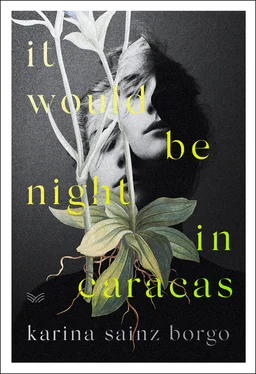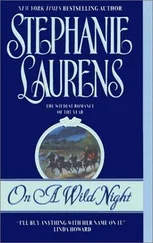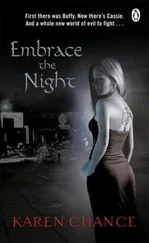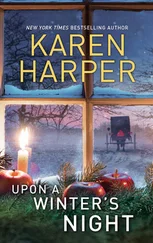The girl gyrated her pelvis, no expression on her face, indifferent to the teasing and obscenities, indifferent even to the slaps of a mother who looked to be auctioning her young virgin off to the highest bidder. Each time the girl thrust, the men and women salivated and spat aguardiente and applauded. The Ford Zephyr was now far from the scene, but I could still make out a second girl, a little chubby, getting onto the casket and straddling it too, rubbing her sex against the brass plate that was burning with the heat of the sun, beneath which some man was lying stiffly, awaiting putrefaction.
In the heat and steam of that city, separated from the sea by a mountain, every cell of the dead body would start to swell. The flesh and organs would ferment. Gases and acids would bubble. Pustules would attract flesh feeders of the kind that grow in lifeless bodies and scurry around in shit. I looked at the girl rubbing herself against something dead, something about to become a breeding ground for worms. Offering sex as the final tribute to a life ripped apart by bullets. An invitation to reproduce, to give birth and bring more of his offspring into the world: swarms of people who just like flies and larvae would have brief lifetimes. Beings that would survive and proliferate thanks to the death of others. I would feed those same flies. Each of us belongs to the place where our dead are buried.
The midafternoon radiant heat meant that the mirage that obliterates landscapes had risen over the asphalt, making the concentration of men and women shimmer like a life-and-death grill. We drew farther away and started down a shortcut that was even worse. I could only think about the moment when the sun would drop below the horizon and light would be gone from the hill where I’d left my mother all alone. Then I died once more. I was never able to rise again from all the deaths that accumulated in my life story that afternoon. That day I became my only family. The final part of a life that nobody in that place would hesitate to cut short, machete blow by machete blow. By blood and fire, like everything that happens in this city.
I THOUGHT THREE BOXES would be enough to pack away my mother’s things. I was wrong. I needed more. At the dresser, I inspected what was left of the La Cartuja plates. A collection of loose pieces, enough to dish up soup, mains, and dessert for three in a modest household. It was chinaware trimmed with burgundy edging that had a rural scene in the middle. Not much, sincere and modest. I never knew where it had come from or why it was in our home.
In the story of us there was no wedding with a registry, no grandmothers with Canarian accents and Andalusian looks who plied us with fried torrijas that they dished up on those plates during Semana Santa. On that chinaware we placed our steamed vegetables and the sad pieces of chicken that my mother skinned in silence. Eating off them, we honored no one. We came from nobody and belonged to nothing. My mother told me, in her final days, that my grandmother Consuelo had gifted her the eighteen-piece set the day she finally saved enough money to buy the small apartment we’d been renting. A dowry fit for the gardenless kingdom that we founded together.
The chinaware had been left to my grandmother Consuelo by her sister Berta, a woman with Amerindian eyes and black skin who had been married to Francisco Rodríguez. He had asked for her hand in marriage six months after arriving in Venezuela from Extremadura and had built the Falcón guesthouse brick by brick in the heat of the Aragua coast. When he died, everyone started calling Great-Aunt Berta the musiú ’s widow, a moniker for all Europeans who arrived in the forties, a translation, if it can be called that, of monsieur . My mother told me there was only one photograph of the man from Extremadura. It was from the day of his wedding to Berta Falcón, who from that moment forward went by the name of Berta Rodríguez. He, a great hulk of a man, appeared dressed in his Sunday best alongside the striking mixed-race woman, or at least that’s what my mother told me about the photo she saw but I never did.
My mother and I ate off the plates of dead people. How many meals must Great-Aunt Berta have cooked and served up on them, day after day? Would she have cooked the repertoire of a woman who moved her large berth around a kitchen smelling of cloves and cinnamon? Whatever the case, those plates emanated just one truth: my mother and I resembled one another only. Through my veins ran blood that would never help me escape. In a country where everyone was made from someone else, we had no one. The land we came from was our only life story.
Before wrapping it in newspaper, I looked at the sugar bowl, never used, that had been forgotten at the back of the dresser. We never sweetened anything we lifted to our mouths. We were skinny like the tree that presided over the dirt patio of the Falcón guesthouse and dropped a dark and sour fruit. We called them “stone plums” because of the tiny amount of flesh and the huge pit. Their centers distinguished them from other fruit. It was almost a pebble, a rough pit rounded off by the sour flesh that gave the small, withered trees, which once a year brought forth the miracle of their fruit, their name.
The stone plums grew in poor soil all along the coast. Children climbed in their branches and stayed up there like crows. Creatures that sipped up the little that the earth gave them. If our trips to Ocumare coincided with the season, we brought back two or three bags chock-full. It was up to me to collect the best ones. My aunts prepared a viscous sweet with them. They let them soak all night and then boiled them with grated sugarcane blocks. After letting the mixture simmer over low heat for several hours, a dark treacle formed. Not just any plum would do, only those that were about to fall from the tree. If they were green, it was better not to touch them; the ones that were still ripening were no good either because they made the treacle bitter. They had to be fully ripe, almost purple, and round and soft.
Collecting them was a painstaking process, accompanied by more than a few instructions.
“Squeeze them like this. Look.”
“If it’s soft like this, put it in the bag; as for the others, put them aside and wrap them in newspaper later.”
“That’s so they ripen. If you’re not going to explain properly, Amelia, how do you expect her to understand? Don’t eat too many. They’ll upset your stomach.”
“Take this bag.”
“Not that bag, Amelia. This one!”
Clara and Amelia kept interrupting each other. I nodded, then they let me go in peace. I wandered down the corridor and out to the patio. I climbed the tree and started pulling the fruit from the branches. Some came away easily while others resisted, coming free only when I yanked them. When I was done, I gave my aunts the ripest fruit, perfect for the sweet that they prepared in their huge stockpots laden with fruit and syrup. I still remember their silhouettes through the steam, a cloud that always gave me enormous cravings as it enveloped those robust women who tipped kilos of sugar into boiling water and stirred it hard with their wooden spoons.
“Get out of here, girlie. If one of these stockpots falls on your head—” said one.
“You’ll be crying all the way from here to kingdom come,” finished the other.
I made the most of the scolding to slip away and rescue the small pile of plums hidden in the garden, all for me.
Sitting on the highest branch, I sucked the flesh from them. I sucked and nibbled them right down to the pit, where there was always a little flesh still attached. Eating a stone plum was an act of perseverance. You had to remove the hard skin, then tear and wrench at the flesh with your teeth until you were scraping at the stony heart. Once it was smooth, I swished the pit from one side of my mouth to the other, as if it were a hard-boiled candy. And even though my mother threatened me by saying that if I swallowed the pit a plum tree would grow in my stomach, I enjoyed the smooth feel of it in my mouth. Only when the pits were completely fleshless did I spit them out, letting fly a slobbery stone that fell to the ground short of my aim, not even grazing the skinny dogs that watched my every move, expecting me to share my afternoon snack. I tried to shoo them away, waving my hands in the air. But they, with their mangy poodle eyes, stayed put, still as statues, watching me eat.
Читать дальше












